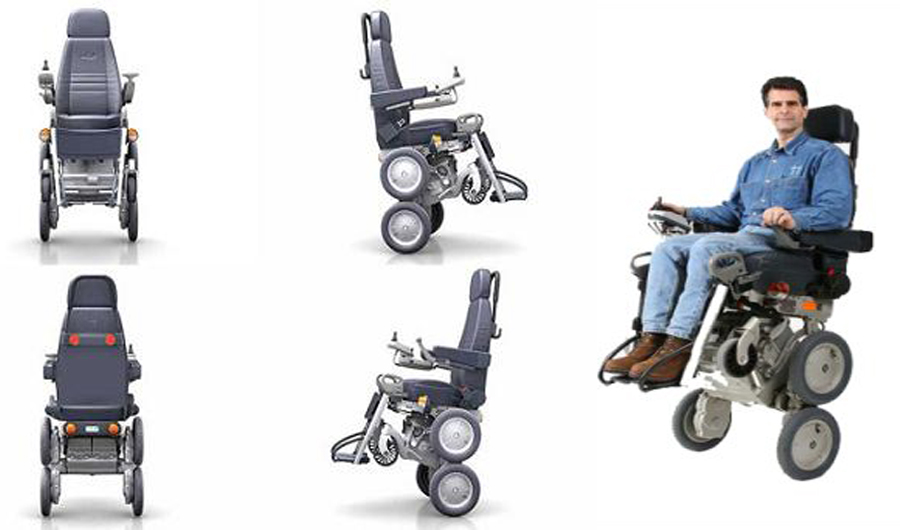Dean Kamen assisted to the Paralyzed Veterans of America’s 70th annual anniversary to announce that DEKA and Toyota are working together to bring back the iBOT. DEKA is a research and development company based in New Hampshire. They’ve joined Toyota in order to develop a revolutionary automatic electric chair.
The project was presented years ago and gained a lot of attention, Mr. Kamen even presented the iBOT to the former US president Bill Clinton in the White House in 2000. However, the retail sale cost stopped the project which eventually transformed into the Segway.

Last Saturday, people assisting the paralyzed veteran annual meeting in Jacksonville were pleasantly surprise when the organizers played a video where Dean Kamen, famous inventor and founder of DEKA and AutoSyringe, was shown riding an automatic wheelchair. In the video, the inventor explained that his company, DEKA, would join forces with Toyota Motor North America to bring back to life the iBOT, a foster mobility solution for the disabled community.
The device run on 4 wheels and it is a little taller than a traditional wheelchair. They are adaptable and can maneuver in a way that allows the user to climb up and down stairs, go through uneven terrain, move up and downhills and much more. One of the iBOT’s modes allows the user to rearrange the wheels in an almost vertical way and by doing so, the person is elevated to a “walking position”. In that mode, the device becomes similar to the Segway and according to Mr. Kamen, “it allows a disabled person to walk side by side with his partner and family”.
Excited to join forces with DEKA R&D and Dean Kamen to support mobility solutions for the disabled. #iBOT pic.twitter.com/Idv4M1inIh
— Toyota USA (@Toyota) May 21, 2016
The struggle for DEKA regarding patents
DEKA is a very successful company that has a lot of patents under its belt. The syringe pump, an insulin pump and part of the technology used in portable dialysis machines, among many others. To launch the iBOT for the first time, the company joined forces with Johnson and johnson’s Independence Technology division and it was released to the public in the 2000’s. The problem? The retail price was around the $25,000, and Medicare patients paid $5000. With those prices, only a few hundred pieces were sold, and finally, the project was terminated on 2009.
And yet, the iBOT was very promising and caught everybody’s attention, even Bill Clinton’s. The former president of the United States received Dean in the White House, and the inventor seized the opportunity by arriving on the electric chair. There is a famous picture that shows Kamen riding the chair in the “walking position” next to Mr. Clinton.
In spite of his efforts, he and his partners could not solve the cost issue, and he had to freeze the idea to develop the Segway. Fortunately this year, Toyota Motor North America decided to join forces with the inventor in order to give disabled people a much needed aid.
“Toyota and DEKA share the same vision of making mobility available to people of every kind of ability,” said DEKA founder Dean Kamen. “We are excited about this new relationship and excited about what it means for making that dream a reality.”
Osamu ‘Simon’ Nagata said the company has always been interested in mobility solutions for all kind of problems. Nagata is currently the executive VP and chief administrative at Toyota Motor North America. When they heard about the iBOT, the American branch of the company’s staff knew they had to form part of the project, said Nagata.

According to Toyota’s official news site in North America, Toyota will license balancing technologies currently held by DEKA and its associates for medical rehabilitative therapy, but they do not discard other possible purposes. Further involvement of the Asian company on the DEKA’S mobility assistance project is under discussion. Toyota has expressed its desire to help in the improvement of this kind of technology.
“We realize that it is important to help older adults and people with special needs live well and continue to contribute their talents and experience to the world.” Said Osamu “Simon” Nagata at the paralyzed of America’s annual convention.
The market’s demand is always changing
Even though, the new partners want to do something new, the idea of an electric chair is well established. For disabled people, there are a lot of options such as the Golden Compass support, the Cirrus plus HD or the Drive Medical Titan X23 among many others.
All these options have something in common; they provide automated mobility for paralyzed people, and they are expensive. The cheapest versions of electric chairs that are already available in the market cost around $1000, and they do not include most of what makes the iBOT unique.
In a move toward mobility for all #Toyota will collaborate on the next-gen #iBOT wheelchair. https://t.co/WJpIqdhyvT pic.twitter.com/GwcZ3PImrg
— Toyota Motor Corp. (@ToyotaMotorCorp) May 23, 2016
In a lot of ways, DEKA’s concept is just more complete. The existing chairs cannot transit difficult terrain, and they sure can’t go up and down stairs. The “walking mode” is something totally new, and the stability functions are original patterns used by the company in the Segway. Nevertheless, the new association will have to deal with the cost issue because their product might be the best, but if people cannot afford it, it would not make a difference.
Source: Press Room Toyota
